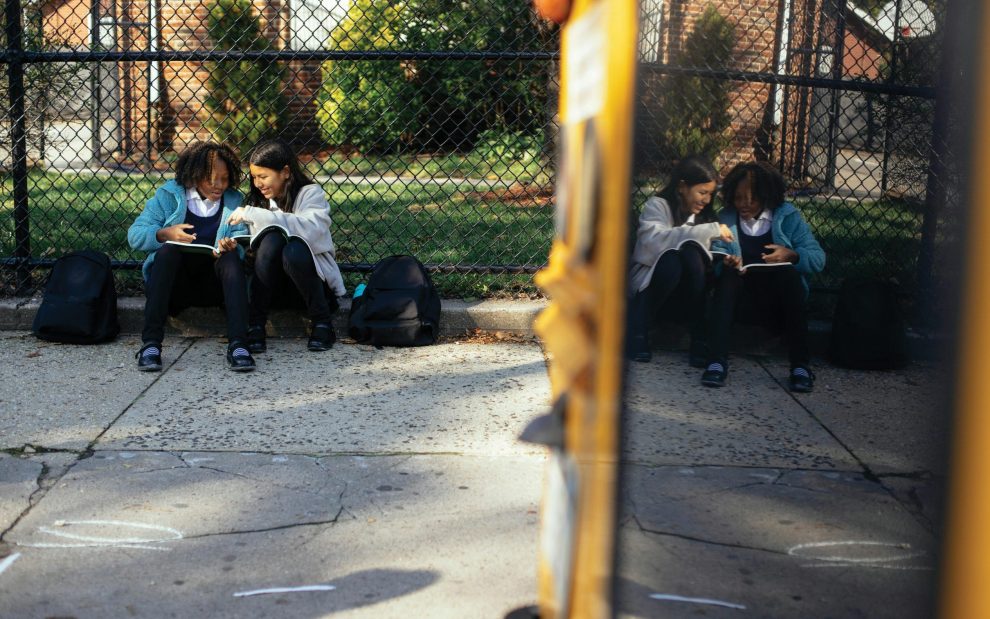I sit in my sunroom, sipping coffee and watching the neighborhood children board the school bus that stops at the corner. I pray for them, and I worry.
The pandemic years affected children’s futures in ways they can’t imagine now. Their teachers and parents are anxious about how far behind they are in lessons and skills they’ll need to survive. The kids aren’t thinking about these things, of course. They’re engrossed in the more immediate kid things: popularity, hair and clothes, what other kids are saying on social media, and what’s for lunch.
But these aren’t the only reasons I pray for them. Sure, they’re behind in math skills—but we have machines to make those calculations now. And maybe they can’t read or spell as well as they should but, frankly, neither skill is well practiced nowadays. They’ve missed a lot of history, geography, and science classes, yet we all forget most of those lessons before we enter the job market. And it turns out that’s OK, since much of what we learned about history was biased, and geography and science are constantly shifting sands of information.
The social skills missed during isolation are more troubling. The kids don’t seem to read faces well, are puzzled by common interactions, and have suffered damage to their emotional intelligence. Still, all that was true before March 2020 due to ubiquitous cell phones and solitary computer games. The future was already going to be full of adults who don’t know how to sit in a room together and have meaningful conversations. Not that many of us do that now in the new cultural polarization.
The main reason I pray earnestly for these children every morning is because I worry about something that seems to be missing from the picture of modern education altogether. Soul-shaping is what I call it. Others might say the formation of character. Regardless of terminology, who’s igniting the interior, spiritual, and moral lives of our children?
Parental attention is decreased by stressed or fractured marriages and the demands of the workplace. Churches aren’t the full-service communities they used to be back when priests and women religious were plentiful and budgets allowed for swollen staff and hefty programming. The soul-shaping elements available to many of us 10 or 20 years ago look a little anemic these days. After school and homework, sports and dance lessons, what time is left and to whom do our children turn for instruction on how to be wise?
It’s easy to relegate matters like wisdom to the Holy Spirit. Wisdom’s a spiritual gift, after all. Isn’t it the Spirit’s job to drop that on our children at some point, signed, sealed, and delivered? Don’t the sacraments supply that in some mystical way?
It’s not that simple. According to the Book of Wisdom, wisdom is a transactive business: We pray, God supplies. But in reality, those whom we call wise got that way through more than a quick session of prayer followed by an Amazon Prime delivery of understanding at the door.
The biblical sages studied for long hours, poring over sacred texts and pondering divine mysteries in solitude. But apart from modern Bible scholars with doctorates and some Greek and Hebrew under their belts, today that kind of wisdom isn’t widely available. Prophets and holy souls got that way after much regular communication with the God they pursued with abandon in deserted places.
Could we still do that, inside the frantic pace of contemporary life? Not without great sacrifice to our families. It would be sad to think wisdom is no longer accessible to any but the celibate and the solitary. Consider, however, that we encounter celibates who are not especially wise and solitaries who are simply lonely.
Those of us directly responsible for the welfare of children want to believe we can form their consciences, shape their souls, and arm them with the elements of sterling character that will make them successful citizens of this world and saints in the next one. Parents, grandparents, teachers, and catechists all hope to assist in the spiritual formation of the next generation. The future needs its holy ones as much as the past did.
Speaking as a catechist who did time in parish religious ed programs, I have to admit we can’t put all our eggs of hope in that basket. Parish programs are burdened with sacramental preparation, teaching prayers, and following imprimatur-stamped curricula that are more about conveying orthodoxy than soul-shaping. If you’re a parent leaving your child’s religious instruction entirely to the church or even to the parochial school system, you may be disappointed with the result.
Wisdom won’t come from the sky. And it won’t come from attending religious classes or from a book—or even a thousand books. So where do we turn if we really want our children—and perhaps our culture at large—to become wise?
Theologian Stanley Hauerwas wrote an influential book decades ago called A Community of Character (University of Notre Dame Press). Even the title suggests that character isn’t entirely a singular pursuit but takes a society dedicated to the task. If our children are raised in a communal environment saturated with material values, greed, and the get-ahead mentality, it will be challenging for them to see beyond it. If all they hear is harshness and criticism at home or all they experience is violence in their neighborhoods, the shape of their souls will reflect these influences.
Martin Luther King Jr. spoke passionately about the Beloved Community: united, justice-seeking, and hope-filled. The Beloved Community is dedicated to lifting up all its members, not just the ones most like ourselves. The poorest are part of us, as well as people who are disabled, refugees, people who don’t speak English or go to our church or share our opinions. The bottom line seems to be that our children aren’t likely to be wise if they’re shaped by the present foolishness.
You and I alone can’t change society. But since we are society as much as anybody is, we can begin to form a subset community of character, a beloved assembly. The children are watching us, hearing us, imitating us. They’re learning from our example and especially our treatment of them. They will be gentle if we are gentle. They will be courageous if we are. They will learn to be forgiving, compassionate, thoughtful, generous, and fair from adults in their environment who are the same. They will also learn from us to be anxious and fearful, or to shout and be ruthless. Our optimism or cynicism is an environmental influence they will carry in their bones.
Maybe wisdom doesn’t fall from the sky so much as seep up from the ground that commonly supports us or float in the air we all breathe together. If we take more responsibility in the shaping of our own souls, being more conscious and deliberate about the values we exhibit in our every decision, our children will observe who we’re becoming and determine to be like us. If we invite Lady Wisdom into our homes, assemblies, workplaces, communities, prayers, and conversations, the spirit of wisdom will seem a little less alien and a little more appealing to the ones who bear the future within them.
So this is my sunroom prayer today: that you’ll join me in forming a cadre of character. That you will pledge in your own prayer space to seek wisdom so that our children will know how to find it. All they’ll have to do is look to you.
This article also appears in the October 2024 issue of U.S. Catholic (Vol. 89, No. 10, pages 47-49). Click here to subscribe to the magazine.
Image: Pexels/Mary Taylor














Add comment